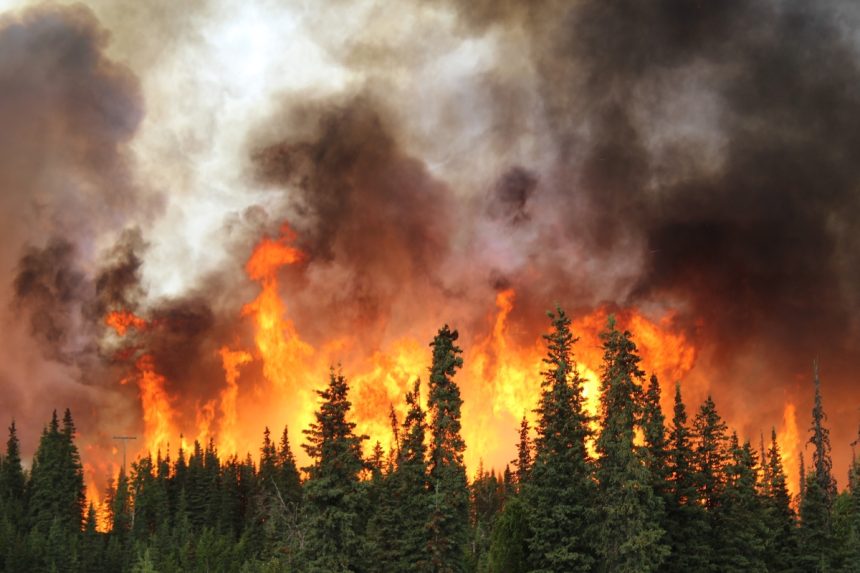As wildfires rage across Spain, Portugal, and Greece, firefighters are struggling to contain the flames during a dangerous and unrelenting heat wave. With temperatures soaring beyond 40°C (104°F) and fire risk at extreme levels, these nations face a growing climate crisis made worse by dry conditions and fossil fuel-driven warming. The battle for control comes as millions observe a major religious holiday, adding a somber tone to an already dire situation.
Infernos Threaten Spain’s Northern and Western Regions
Spain is currently battling 14 major wildfires, according to Virginia Barcones, the country’s general director of emergency services. The national weather agency AEMET has issued warnings of “extreme fire risk” across much of the country, especially in the north and west where the largest fires rage.
“Today will once again be a very tough day, with an extreme risk of new fires,” Spanish Prime Minister Pedro Sánchez warned on X.
The fires have already scorched 158,000 hectares—equivalent to the size of metropolitan London—according to the EU’s European Forest Fire Information System. In Galicia, major highways have been closed and high-speed train service to Madrid remains suspended.
Portugal Extends Alert as Fire Crews Struggle
Nearly 4,000 firefighters in Portugal faced down seven active major fires on Friday. The government extended its nationwide state of alert until Sunday due to continuing high temperatures.
Seeking outside support, Portugal requested help from the EU’s civil protection mechanism, which coordinates firefighting resources from across the continent. Just a day prior, Spain received two Canadair water bombers through the same EU mechanism—marking the first time it has ever tapped into the system for fire-related aid.
Greece Faces Renewed Evacuations on Chios
On the Greek island of Chios, a wildfire has been burning out of control for four consecutive days, forcing additional evacuations overnight. Firefighters received some temporary relief as winds weakened Friday morning, allowing planes and helicopters to resume aerial suppression efforts.
Greece’s fire services were on high alert in areas surrounding Athens and southern regions, where the combination of heat and dry winds has intensified fire risk following a wave of destructive fires earlier this week.
Ecumenical Patriarch Bartholomew, spiritual leader of the Orthodox Christian world, offered words of unity: “We pray for the victims of wildfires across southern Europe,” he said on the day of Dormition of the Virgin Mary, a solemn Orthodox feast.
Religious Holidays Shadowed by Crisis
Friday marked the Feast of the Assumption in Spain and Portugal and the Dormition in Orthodox Greece. But celebrations were disrupted by evacuations, emergency alerts, and thick plumes of smoke hanging over affected communities.
The tragic overlap of religious solemnity with climate disaster made the day even more poignant for many citizens. Churches held prayers not only for the Virgin Mary, but also for the firefighters, displaced families, and lives at risk.
Climate Change Drives Europe’s Fire Season
Scientists warn that climate change is increasing the intensity and frequency of extreme heat and dryness across Europe. “The burning of fossil fuels like coal, gas and oil releases heat-trapping gases that are the primary driver of climate change,” researchers explain.
Europe is warming at twice the global average rate. According to the EU’s Copernicus Climate Change Service, 2024 has already become the hottest year on record in Europe and globally, with the second-highest number of ‘heat stress’ days ever recorded.
The EU’s civil protection force has now been activated as many times this year as in the entire fire season of 2023—underscoring the scale of the emergency unfolding across the continent.
With wildfires blazing and temperatures still climbing, Southern Europe remains in a state of emergency. As governments deploy resources and citizens pray for relief, the reality of a rapidly changing climate becomes harder to ignore. The words of Prime Minister Pedro Sánchez ring loudest: “Extreme risk” is not just a forecast—it’s now a way of life. The call for long-term climate solutions has never felt more urgent.






